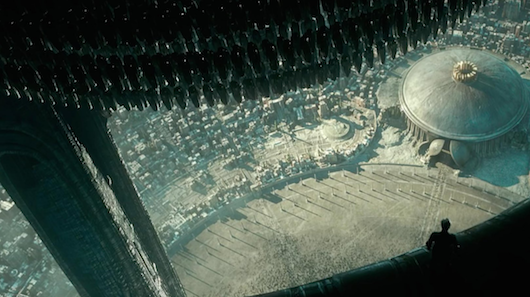 FILM
FILM In Which Katherine Waterston Wears A T-Shirt With No Sleeves
 Friday, June 2, 2017 at 10:00AM
Friday, June 2, 2017 at 10:00AM 
Mother May I?
by ETHAN PETERSON
Alien: Covenant
dir. Ridley Scott
122 minutes
 Alien: Covenant has one truly great scene and a bevy of variously amusing ones. This great scene happens when Oram (Billy Crudup) walks in on David (Michael Fassbender) communicating with a gigantic white alien/humanoid hybrid. He is appalled at what he is seeing, and the fresh corpse that shimmers in a nearby fountain. Still he waits an additional second beyond what might be appropriate before blasting the creature to bits. He tells David, who is an android stranded on the planet Oram has navigated his colony ship to, that he must explain everything to him.
Alien: Covenant has one truly great scene and a bevy of variously amusing ones. This great scene happens when Oram (Billy Crudup) walks in on David (Michael Fassbender) communicating with a gigantic white alien/humanoid hybrid. He is appalled at what he is seeing, and the fresh corpse that shimmers in a nearby fountain. Still he waits an additional second beyond what might be appropriate before blasting the creature to bits. He tells David, who is an android stranded on the planet Oram has navigated his colony ship to, that he must explain everything to him.
The concept of a megalomaniacal android has never been explored too fully, since once such qualities are embodied in an individual, we generally regard them as human. Daniels (Katherine Waterston) is second-in-command on Oram's ship, and she does not need things explained to her. She walks into a room where David displays a series of drawings which explicitly detail the intersections between alien and human life with which he has occupied the past ten years. She has found the lair of a monster, and she looks for a weapon to destroy it.

Waterston is as subtle and expressive an actress as there is. Unfortunately, Fassbender looks pretty bored/confused in his scenes with her, and there is a serious paucity of human-on-human scenes in Alien: Covenant in general. It probably would have been a far better movie as a silent film, since there is really no relationship at all between any of the human characters. As far as the android ones, David is bestowed an extended scene where he teaches the Covenant's resident android Walter (still Michael Fassbender) how to play the flute. It is cute, but not really something you want to think about for more than a minute.
In Alien: Covenant's opening sequence, Daniels loses her husband Branson (James Franco) when the crew of the Covenant is prematurely woken from cryosleep. The ship's internal A.I., called Mother, cannot prevent damage from a solar flare. Branson burns up in his little coffin, and they pump Franco's corporeal body into deep space. It is kind of funny, but not really since Waterson was planning on building a log cabin with her life partner and now she has to do it alone.

The crew sends an expedition team down to a nearby planet which seems to be hailing them. (The cast of Alien: Covenant looks like one of those movies that is going to be picked off by casting directors for years to come: every member of the crew is gorgeous and limber except for Danny McBride.) Although the seed planet has land mass and clean water, they quickly discover there is no animal life at all. This is probably a good tip off that long-term existence would not be possible in this biome, but they decide to explore anyway and find a small ship and their antagonist.
In 2012, Damon Lindelof and Ridley Scott came up with some ideas for the evocative masterpiece that was Prometheus. Determined to focus on the themes of that story rather than the characters, Alien: Covenant is rather boring for a film in this milieu. Yes, the expedition is in danger, but by the time they even realize how dire their straits are, they have no actual narrative time in which to be terrified or make plans to destroy these beasts.

Without much in the way of a tangible script, Scott focuses on what he does so well, better than almost any director in history. That is make visuals which shatter our preconceptions and approaches to familiar material. There is nothing really new about the art design or circumstances of the Covenant's space travel, but Scott and his team manage them more slickly and believably than almost anyone working in this genre. Scott has a fairly good grasp of how much science to bring into this story, and he decides the answer for Alien: Covenant is, not much.
Alien: Covenant is more a fantasy film about how a bunch of hapless humans become prey and stay prey. They were never fit to explore the stars, Scott argues, any more than a monkey could surmise whether or not a God was responsible for his existence. It is a not a good feeling to see humanity as so useless, and so I suspect Alien: Covenant will never be very well liked for its sad ending and the downer way it sees humanity: as a bunch of fragile containers for wildly disparate emotions.
Ethan Peterson is the reviews editor of This Recording.















































